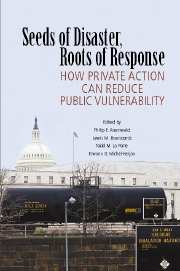Book contents
- Frontmatter
- Contents
- List of Contributors
- Foreword, by General Robert T. Marsh
- Preface
- Acknowledgments
- I SEEDS OF DISASTER
- II A CRITICAL CHALLENGE
- III MANAGING ORGANIZATIONS
- IV SECURING NETWORKS
- V CREATING MARKETS
- VI BUILDING TRUST
- VII ROOTS OF RESPONSE
- 26 Leadership: Who Will Act? Integrating Public and Private Interests to Make a Safer World
- References
- Contributors
- Author Index
- Subject Index
26 - Leadership: Who Will Act? Integrating Public and Private Interests to Make a Safer World
Published online by Cambridge University Press: 30 July 2009
- Frontmatter
- Contents
- List of Contributors
- Foreword, by General Robert T. Marsh
- Preface
- Acknowledgments
- I SEEDS OF DISASTER
- II A CRITICAL CHALLENGE
- III MANAGING ORGANIZATIONS
- IV SECURING NETWORKS
- V CREATING MARKETS
- VI BUILDING TRUST
- VII ROOTS OF RESPONSE
- 26 Leadership: Who Will Act? Integrating Public and Private Interests to Make a Safer World
- References
- Contributors
- Author Index
- Subject Index
Summary
“To be courageous … requires no exceptional qualifications, no magic formulas….
It is an opportunity that sooner or later is presented to us all.
The stories of past courage can define that ingredient, –
they can teach, they can offer hope, they can provide inspiration.
But they cannot supply courage itself. For this each man must look into his soul.”
John F. Kennedy, Profiles in Courage, 1956At the outset of this book, we asserted that the combined efforts of the government and the private sector have not adequately reduced the public's vulnerability to catastrophic terrorist attacks, natural disasters, and other low-probability, high-impact events. Contributors to this volume have discussed five elements of a coherent and complete response: evaluating vulnerabilities, managing organizations, securing networks, creating markets, and building trust. The effectiveness of each depends on the execution of the others. Yet none will develop without a sixth element: sustained commitments carried out through effective leadership.
By “leadership” we do not mean the political image of a charismatic individual able to mobilize action through sheer force of personality (although that is a valuable, albeit rare, attribute). Rather we mean the assumption of responsibility and accountability by individuals with sufficient authority over resources and decisions to effectively address catastrophic events. As many studies document, however, the reality of an immediate response to a disaster is overwhelmingly unplanned, decentralized, and the product of private action – “leadership” on a micro-level, perhaps, but not at the scale of national policy.
- Type
- Chapter
- Information
- Seeds of Disaster, Roots of ResponseHow Private Action Can Reduce Public Vulnerability, pp. 483 - 506Publisher: Cambridge University PressPrint publication year: 2006
- 3
- Cited by

